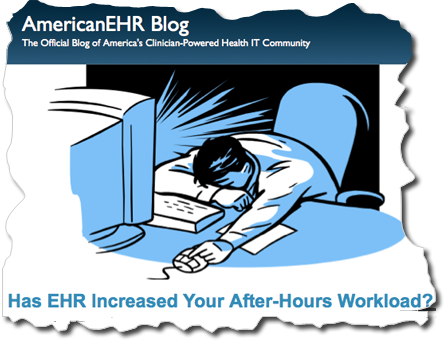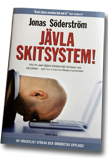”I long for the days of the paper chart”
Publicerad 17 februari 2013 | Inga kommentarer ännu
Som framgick av inlägget House på riktigt är det inte bara i Sverige som vi har problem med bristfälliga it-system.
American EHR Partners – en branschorganisation för ejournalsystem (Electronic Health Records på engelska) konstaterar att en allmän iakttagelse är att e-journaler ökar arbetstiden. Läkare behöver tillbringa mer tid på kliniken – eller ta hem och göra jobbet hemma på kvällen:
”One of the comments we hear from clinicians who have implemented an EHR is the impact on their after-hours workload, whether this be in the clinic at the end of the day or at home in the evenings. This feedback is not limited to specific EHRs and tends to be a more widespread issue. The following comments were submitted by physicians who completed the AmericanEHR Partners EHR satisfaction survey:
- I can get through my day, but I spend an extra hour to two hours longer at the office than I used to prior to our implementation of the EHR. This is really bothersome to me.
- It makes a 15-minute visit take 2–3 times as long. I’m not sure I’ll ever be able to get back to my pre-EMR volume. Some nights, if I have a meeting after work, I’m up working on charts until 1 am! And that’s only working at 80% of my previous patient volume! There has to be a better way… talk about burnout.
- Radiology reports are now coming across through an interface, but we are unable to see images — for this we must log onto a remote desktop for the hospital in a separate application. I am routinely having to finish charts at home after work.”
Has EHR Increased Your After-Hours Workload?
(9 nov 2012)

Kommentarerna på blogginlägget är entydiga. Genom att styra arbetssättet i detalj kräver systemen massor av tid, och skapar så mycket trivial information att det är svårt att hitta det livsviktiga:
- ”I consider it extremely important to choose an EMR system that does not require a specific work-flow to produce each chart note. Not all visits require a review of Family History, for example. However, many systems require you to at least click through a variety of screens if only to accept their entries.”
- ”I certainly feel that this is the case. (I am finishing some up this weekend!) Meaningful use [en amerikansk standard för journalanteckningar, min anm] has added multiple lists I need to click through, including re-affirming all office visits even after I dictate.”
- ”Pages and pages of repetitive nonsense and the actual life saving information is not there! We are aproaching the EHR tower of Babylon, where communication is impossible.”
Någon längtar till och med tillbaka till papperstiden:
”Occasionally we have a patient come to the office from the pre-EHR (3 yrs ago) days. For them, we are first handed the old paper chart from the back room files before beginning their note.
What a difference! The paper charts were simple, accurate, quick, and streamlined. All the things the behemoth “Practice Partner” system claimed to be. I long for the days of the paper chart.
The sad fact is that EMR in its present state is inefficient, dangerous, and uses 3 times more paper than our paper system ever did. It is the perfect example of what happens to a system when it is overtaken by bureaucrats and self-serving paper pushers.”
Jag förstår frustrationen, men om man längtar tillbaka till papper är det nog till en del för att man inte känner till hur bra system kan se ut idag. Läs mer i inlägget Det är i alla fall bättre än häst och vagn.
Kommentarer
Skriv en kommentar

